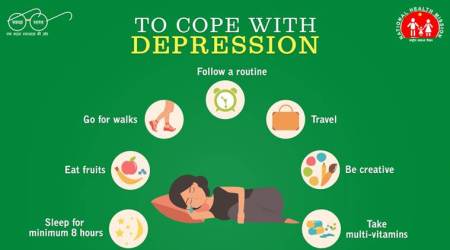
Learn to distinguish between the two psychological states.
Being sad is one of the primary reasons for depression. (Source: Thinkstock/Getty Images)
-

Bi-weekly aerobic exercises may help combat depression, schizophrenia
-

Pune: For more support to patients, family wards to be set up in mental hospital at Yerawada
-

Rent A Boy|Friend – helping women “avoid” & “cure” depression one boyfriend at a time
“I had always been a happy-go-lucky girl, but there was a sudden change of behaviour in me. When I got depressed for the first time I didn’t know about it. I was getting sleepless nights, felt less confident and second thoughts used to come, I’d get irritated at the smallest of things and yell at my husband,” explains Deepannita Chakraborty, an educationist based in Noida, who has been undergoing treatment for clinical depression for the past six months.
Depression, after all, doesn’t need to be triggered by or linked to one specific incident. And can happen to anyone. And contrary to what many of our politicians and self-proclaimed “gurus” have been claiming, depression is not the same thing as simply feeling sad or blue. You can’t just snap yourself out of it or get yourself a hobby – and find that you suddenly don’t have depression.
There is a clear difference between sadness and depression – but to complicate matters, being sad is one of the primary reasons for depression. Speaking to indianexpress.com, Neerja Birla, the founder of Mpower, a state-of-the-art Mental Healthcare Center in Mumbai explains how to distinguish between sadness and clinical depression.
“There is definitely a difference between the psychological states of ‘sadness’ and ‘depression’. Sadness is an emotion that we all experience from time to time. It is triggered by difficulties, challenges and even bad experiences or upsetting situations. But the key thing to note is that we feel sad – ‘about something’. And when the situation changes or we stop feeling distressed by that experience, the sadness goes away.
Depression, on the other hand, is when you feel sad about everything. It is an abnormal emotional state and a mental illness that has a chronic effect on our emotions, thinking and behaviour. It can cause feelings of helplessness, anger, fear, frustration, guilt, and sadness. It doesn’t require a bad experience or a challenging situation. It doesn’t require a trigger or a reason and can afflict anyone and everyone. It can affect all aspects of our lives — personal, professional and social. Even when things are good in life and you have no explicable reason to be sad, you can become depressed. When one is suffering from depression, one tends to lose interest even in things that were otherwise pleasurable, have little or no energy, become prone to mood swings, develop negative feelings and even harbour thoughts of self-harm.”
Sharing her story, Chakraborty says, “During depression, people start behaving differently from their usual behaviour. You feel that the whole world is crushing you.
When I realised that this was not my usual behaviour, I spoke to my family about this. Initially, they didn’t understand my problem but later on, they too realised. My husband has been a rock support through all of this. Symptoms like anxiety, irritability and anger issues signify that there might be something that is troubling a person and they might be depressed. My husband took me to a psychiatrist and there I was diagnosed at a critical stage of depression.
The treatment is still on and I’m on anti-depressants. In fact, if I don’t take the medicines for one day, then I feel irritability and have anger issues. My doctor advised to continue medication and that this will take time to heal. I would advise depression patients who are taking medication not to stop their treatment if they really want to cure themselves. They have to trust their doctors. If one stops their treatment, they might feel good for the first three-four months, but then if it relapses, the situation becomes worse than before..”
Some of the other symptoms of depression include:
*The inability to concentrate or focus, fulfill responsibilities, make decisions and meet deadlines.
*Feigned happiness where one puts up an act or a facade of being gung-ho about everything.
*Lack of interest in engaging socially, a desire to be left alone and the inability to connect even with people emotionally.
* Anhedonia – the loss or decrease in the ability to enjoy things that one may have found immensely pleasurable in the past.
![]()
![]()
 Lenovo Ideapad 130 (Core i3 – 6th Gen/4 GB RAM/1 TB HDD/39.624… ₹ 30740 MRP ₹ 35890 -14%₹4000 CashbackBuy Now
Lenovo Ideapad 130 (Core i3 – 6th Gen/4 GB RAM/1 TB HDD/39.624… ₹ 30740 MRP ₹ 35890 -14%₹4000 CashbackBuy Now Asus Vivobook X510UA-EJ1070T(15.6"FHD anti Glare/i3-8130U(8th Gen.)/4 GB DDR4/1 TB/WIN10/FingerPrint/Backlit KB/GOLD/1Y) ₹ 42990 MRP ₹ 47990 -10%₹4299 CashbackBuy Now
Asus Vivobook X510UA-EJ1070T(15.6"FHD anti Glare/i3-8130U(8th Gen.)/4 GB DDR4/1 TB/WIN10/FingerPrint/Backlit KB/GOLD/1Y) ₹ 42990 MRP ₹ 47990 -10%₹4299 CashbackBuy Now
*Suicidal thoughts or tendencies – arising out of the negativity.
Most importantly, according to Birla, “With the increasing rate of mental health concerns among young people, we can’t sweep this issue under the rug anymore. Awareness and support are two essential things that we need to tackle this.”
Must Watch


How much money did the UP government spend on maintaining former CMs' bungalows: News in Numbers


Shilpa Shetty on playing cupid on her new show Hear Me Love Me


Congress likely to win Rajasthan, Madhya Pradesh, and Chhattisgarh elections, says ABP News C-voter survey


Kajol Reveals Why She Is A Helicopter Mom
For all the latest Lifestyle News, download Indian Express App
-

Midlife fitness may boost your heart health
-

A Health Ministry poster on coping with depression has angered doctors
Source: Read Full Article